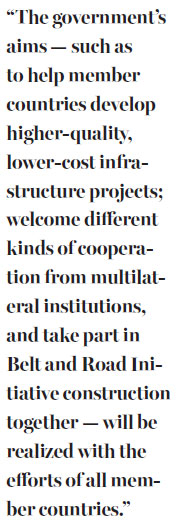AIIB will do things a little differently
Updated: 2016-03-11 08:09
By Gao Bei(China Daily Europe)
|
|||||||||
New infrastructure investment bank will learn from its established peers, but aims for added flexibility
The Asian Infrastructure Investment Bank began operations on Jan 16, with its 57 founding members witnessing its launch.
In his speech at the opening ceremony, President Xi Jinping said: "The founding of this bank proves once again that whenever there is a will, there is a way."
As a China-initiated multilateral bank, various sides questioned the bank when it was put forward. With support from the Chinese leadership, the government communicated with many countries on the foundation of the bank many times. Based on fairness and collaboration, the bank gradually won approval from some countries.

Twenty-one countries signed a preliminary agreement on Oct 24, 2014, to establish a new multilateral bank to finance infrastructure projects in Asia, and then in June last year, founding members signed the articles of agreement in Beijing, another important milestone. The articles took effect and the bank was officially established on Dec 29.
As a regional multilateral development bank, it has borrowed the mature experience of its peers. At the same time, the bank has incorporated some new things.
First, compared with its established peers, the AIIB is more open and inclusive. For example, it allows loan recipients to resort to global procurement for their products instead of restricting them to purchase only from its members. This practice will allow loan recipients to source the products that best suit them and maximize the benefits.
Second, the bank has reformed the bloated, overstaffed structures of existing development banks. For example, the AIIB does not have a permanent board of directors. It has only a few agencies outside China. It has only 500 to 600 staff members, which effectively reduces the bank's operational costs. Also, the bank has easier procedures for assessing and approving loans. This creates a simple framework and is highly efficient.
Third, the bank will have a more flexible investment model. Bank loans, equity investments and financial guarantees would be done at the same time, which can integrate market resources and take them into infrastructure construction at the largest scale. It would boost the bank's leverage effect, increasing infrastructure construction projects' attraction to private investors.

And last, while the bank shares common principles with other multilateral financial institutions in terms of transparency and social and environmental concerns, what is unique to the AIIB is that it is not obsessed with free-market policies. That is to say, the bank will not set privatization and the loosening of capital controls as conditions for countries to apply for loans.
The bank has received some criticism, but we believe different sides will come to an agreement through better communication.
The founding of the bank will benefit infrastructure construction investment in Asia, and promote regional communication and economic integration, but it is like to face many challenges.
The first is ratings pressure. Even though the bank has an accurate functional orientation, huge market potential, a high rate of paid-in capital and is supported by its shareholders, the rating agencies may lower its rating because they worry that the main shareholders lack experience in running multilateral financial institutions.
The second is whether the bank will insist on high standards during the process of managing projects, one of the biggest criticisms from the international community.
The third is the AIIB's collaboration with other multilateral financial institutions. Some say the foundation of the bank is a challenge to the existing international financial rules, and it will compete with its peers.
Even though questions and challenges may not disappear immediately, the Chinese government's determination regarding the bank can be seen from Xi's statement. The government's aims - such as to help member countries develop higher-quality, lower-cost infrastructure projects; welcome different kinds of cooperation from multilateral institutions, and take part in Belt and Road Initiative construction together - will be realized with the efforts of all member countries.
The author is a researcher with the Institute of World Economics and Politics at the Chinese Academy of Social Sciences. The views do not necessarily reflect those of China Daily.
Today's Top News
Inspectors to cover all of military
Britons embrace 'Super Thursday' elections
Campaign spreads Chinese cooking in the UK
Trump to aim all guns at Hillary Clinton
Labour set to take London after bitter campaign
Labour candidate favourite for London mayor
Fossil footprints bring dinosaurs to life
Buffett optimistic on China's economic transition
Hot Topics
Lunar probe , China growth forecasts, Emission rules get tougher, China seen through 'colored lens', International board,
Editor's Picks

|

|

|

|

|

|







